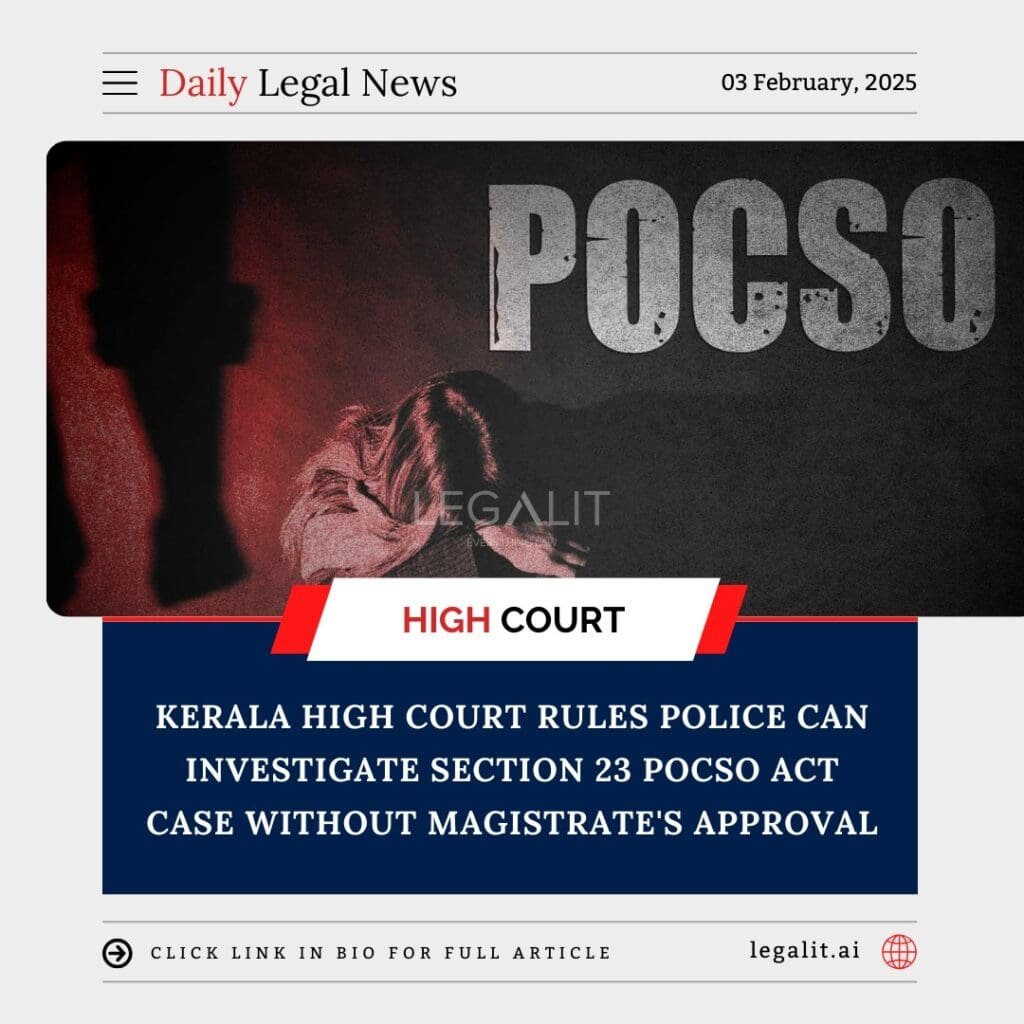
Background
In a significant ruling, the Kerala High Court has clarified that police authorities are empowered to investigate cases under Section 23 of the Protection of Children from Sexual Offences (POCSO) Act without prior approval from a magistrate. The court’s decision comes after a legal challenge questioning whether the police could initiate such investigations independently or required magistrate permission in such matters. Section 23 of the POCSO Act deals with the penalty for the use of child for pornography, a severe offense aimed at protecting minors from exploitation in digital and physical spaces.
The case stemmed from a petition filed by a defendant who argued that the police did not have the legal authority to investigate cases under Section 23 without obtaining prior authorization from a magistrate. This brought into focus the procedural aspects of how such cases are initiated and the role of the judiciary in overseeing the investigative process.
Court’s Rationale for the Decision
- Autonomy of Police Investigation:
- The Kerala High Court emphasized the autonomy of law enforcement agencies in cases where immediate intervention is necessary to protect vulnerable children. According to the court, Section 23 of the POCSO Act does not require magistrate approval for police to start an investigation, as it falls within the scope of the police’s duty to prevent crimes and protect minors from harm.
- Objective of the POCSO Act:
- The court noted that the primary objective of the POCSO Act is to safeguard children from sexual exploitation, including online pornography, and to ensure swift legal action against offenders. Any delay in initiating an investigation due to bureaucratic hurdles could hinder the effectiveness of the law and the protection of minors. The ruling underscores the urgency and the need for law enforcement to act promptly when it comes to matters related to child safety.
- Interpretation of the Law:
- The Kerala High Court further argued that the POCSO Act was designed to empower police authorities to take proactive steps in cases where children are at risk. Requiring magistrate approval, in the court’s view, could slow down the investigation process and potentially allow offenders to escape justice. The court found no statutory requirement in the law that mandates magistrate intervention before the police can conduct such investigations.
- Protection of Children’s Rights:
- The ruling is also seen as a step forward in ensuring that the protection of children’s rights takes precedence. The court stressed that any legal framework that obstructs quick police action in cases involving minors could lead to increased exploitation and victimization of children.
Reactions and Criticism
- Support for the Decision:
- Child rights activists and legal experts have largely supported the Kerala High Court’s decision, praising it as a forward-thinking approach to tackling child exploitation. Advocates for children’s protection argue that such rulings will make the law enforcement process more responsive and efficient in addressing the growing concerns related to child sexual abuse and pornography.
- Several experts have also highlighted that the ruling aligns with the broad objectives of the POCSO Act, which aims to ensure that justice is delivered swiftly to protect children from harm.
- Concerns from Legal Practitioners:
- On the other hand, some legal practitioners have raised concerns about the potential for misuse of this ruling. They argue that while the intention behind the decision is sound, allowing police to investigate without a magistrate’s approval could lead to an abuse of power in certain cases. Critics suggest that safeguards should be in place to ensure that police investigations are conducted in a manner that respects due process and protects the rights of individuals.
- Impact on Legal Precedents:
- This ruling is likely to influence similar legal cases across India, particularly in matters where the police seek to investigate cases involving vulnerable individuals such as minors. The decision could set a precedent for how such cases are handled, particularly regarding the procedural requirements for initiating investigations and the role of magistrates in overseeing them.
Implications for the POCSO Act and Future Investigations
- Faster Investigations:
- The ruling paves the way for quicker investigations in cases of child exploitation, as it eliminates the need for additional administrative approval before police can take action. This is expected to lead to faster legal proceedings, which is crucial in cases involving children, as delays can sometimes exacerbate trauma or allow perpetrators to evade justice.
- Potential for Expanding Police Powers:
- While the decision is seen as beneficial in terms of expediting investigations, it also opens the door for further legal debates regarding the limits of police powers. There may be future challenges related to the balance between empowering police authorities to act swiftly and protecting individuals from potential misuse of power.
- Enhanced Vigilance on Child Protection:
- With the increased autonomy given to police in investigating such sensitive cases, there may be an added focus on training law enforcement officers to handle child protection cases with greater sensitivity and care. It also calls for the establishment of better oversight mechanisms to ensure that investigations remain fair and just.
Conclusion
The Kerala High Court’s decision to allow police to investigate cases under Section 23 of the POCSO Act without magistrate approval is a landmark judgment aimed at protecting children from exploitation and pornography. While the decision strengthens the law enforcement response to child abuse, it also raises questions about the balance between swift justice and safeguarding individuals’ rights. Going forward, this ruling could have broader implications for police powers in cases involving vulnerable populations and may influence legal reforms to streamline processes for child protection.